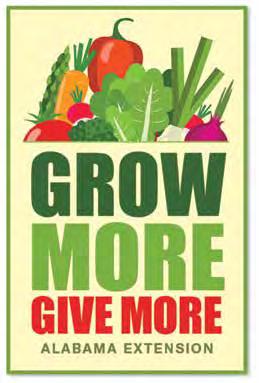
4 minute read
The Magic of Gardening
Grow More, Give More
First, I want to tell you about a new program Extension is developing for home gardeners called “Grow More, Give More.” Then I have some tips about bitter cucumbers, squash and their relatives that will help you avoid this problem.
Advertisement
The Grow More, Give More initiative is a program designed to encourage gardeners to share their bounty with those in need by growing a little extra to give away. A group of Alabama Extension horticulture agents and Extension Master Gardener volunteers are promoting community-based gardening in 2020.
How It Will Work:
Extension agents will develop and distribute teaching videos and kit plans for growing vegetables at home. For example, to grow tomatoes in a 5-gallon bucket, Extension will suggest supplies needed, where to place, when to plant and how to maintain it. The same will be true for other crops such as beans,

greens, cucumbers and peppers. Plans for large containers, raised beds and in-ground garden rows will also be addressed.
Information will be delivered via a variety of platforms. Brief online tutorials via videos on the Alabama Extension website (see link address below). Resources and information are available on the Extension website (www.aces.edu). One-on-one assistance through the Master Gardener help line at 877-252-4769 and through your local county Extension office whose number you can find on the Extension website. Also, you will want to visit and “Like” the Alabama Smart Yards Facebook page at this web address: https://www. aces.edu/go/growmorefacebook. Plans are still being finalized on the Give More aspect of the program, but people who grow more than they can use are encouraged to share with neighbors or donate to a local food assistance effort.
Contact your local county Extension office to ask about how you can participate in the Give More part of the program.
So, let’s get growing! Whether a backyard garden is a new interest or you have experience, we have answers for your garden. Check out short training videos to help get you started at this web address: https://www.aces. edu/go/growmorevideos.
If you are a new gardener, you need to know the information that follows about bitter fruit. If you are an experienced gardener, you have likely experienced this problem, but the information here can help you avoid the issue in the future.
About this time each year when the days get long and extremely hot, the enthusiasm of having a vegetable garden sometimes starts to wane. You might say the weather adds to our stress level. What is true for us is also true for garden plants. Most years after we have had our first few harvests of cucumbers and squash, we find the fruit will sometimes become very bitter.
The bitter taste of squash and cucumbers comes from a natural organic compound called cucurbitacin (I can’t pronounce it either). It may surprise people that plants do not always want to be eaten. Some of these plants not only do not like being eaten but they actually try to do something about it by making themselves taste bad. I often hear people talking about abandoning the use of chemicals and eating and using only “natural” things. However, we need to remember that not everything in nature is good for you and some things are downright dangerous. That is the case with this compound which can cause severe stomach pains or even worse. On the plus side, there is the warning to avoid eating them when they become bitter. Only the bitter compound is unsafe to eat.
If the fruit are extremely bitter you might as well pull the plant up and start again because they will not likely become “unbitter.” If the fruit are only mildly bitter, there may be hope depending on how stressed and what has caused the plant stress.
One myth you may believe is that planting cucumbers near cantaloupes will make the cantaloupes bitter. Although many members of the cucurbit family can cross-pollinate, this will not affect the taste of the cantaloupes or other cucurbit family members. If cross-pollination occurs between members of this plant family, the seed but not the plant flesh are affected.
In cucumbers and squash, bitterness is very common and can be caused by several factors. The most likely reason is plant stress. The problem tends to be worse when extremes exist. Extreme heat, cold, drought or excess water, lack of plant nutrients or even extreme pest and disease pressure can bring on a problem. If you can identify and correct the stress soon enough, the plant may stop producing the excess amounts of the bitter compounds. Most often, by the time you know about the bitterness it is too late to correct and it would require more time and labor to plant again. These type crops should be planted monthly anyway to assure continual harvest.
If you find you have some mildly bitter cucumbers, it helps to know the bitter compound is usually more concentrated in the stem end rather than in the blossom end of the fruit. Also, the skin tends to accumulate these compounds more than the flesh. Therefore, if the fruit is only mildly bitter, you should peel the fruit by starting at the blossom end of the fruit and cut off a couple inches near the stem end. Wash the knife frequently to avoid spreading the bitter compounds to other fruit.
Happy gardening and hang in there through the dog days of summer because cooler weather will eventually reduce your stress and the stress on your garden vegetables.











